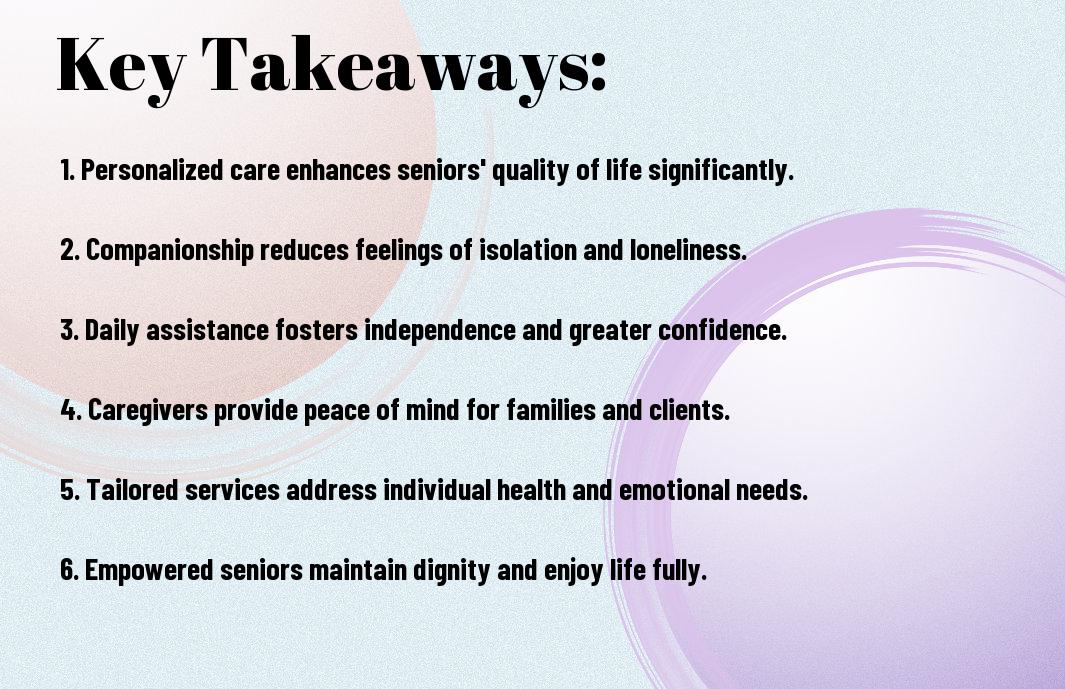Over the years, many senior clients have shared how home care services have significantly improved their quality of life. Through personalized support and companionship, they have experienced a sense of independence and dignity often lost in daily challenges. These services not only assist with healthcare needs but also foster emotional well-being, allowing seniors to engage in activities they love. For insights on how these transformations unfold, readers can explore Getting on with Living Life: Experiences of Older Adults after ….
Key Takeaways:
- Enhanced Independence: Home care services empower seniors to maintain their independence while receiving necessary support tailored to their individual needs.
- Emotional Well-being: Companionship provided by caregivers significantly improves the emotional health of senior clients, reducing feelings of loneliness and isolation.
- Personalized Care Plans: Customized care plans ensure that seniors receive the specific assistance required for their health and lifestyle, promoting better overall quality of life.


Understanding Home Care Services
While the concept of home care services might seem straightforward, it encompasses a wide range of support options designed to assist seniors in maintaining their independence and quality of life. These services not only promote health and well-being but also facilitate a comfortable living environment tailored to individual needs.
Definition and Overview
Care services at home provide personalized assistance to seniors, allowing them to age in place with dignity and security. This includes both medical and non-medical support, ensuring that seniors receive the care they require in the comfort of their own homes.
Types of Home Care Services
Types of home care services can be categorized as follows:
| Personal Care | Assistance with daily living activities such as bathing, grooming, and meal preparation. |
| Companionship | Emotional support and companionship to alleviate feelings of loneliness. |
| Skilled Nursing Care | Medical care provided by registered nurses, including wound care and medication management. |
| Physical Therapy | Rehabilitation services to help improve mobility and regain strength. |
| Custodial Care | Long-term care focused on assisting with daily living without medical needs. |
Knowing the distinct types of home care services available can help families make informed decisions about the level of support needed for their loved ones. Each service plays a crucial role in enhancing the quality of life for seniors.
A more in-depth exploration of home care services reveals various support options that cater to the diverse needs of seniors.
| In-Home Health Aides | Provide necessary support with personal care and household tasks. |
| Home Health Services | Include monitoring vital signs and administering prescribed medications. |
| Respite Care | Temporary relief for family caregivers, allowing them to take a break. |
| Home Modifications | Alterations to ensure safety and accessibility within the home. |
| Transportation Services | Assist seniors in attending appointments or social gatherings. |
Knowing the comprehensive range of home care services available is vital for families seeking the best solutions for their elderly relatives. Each service is aimed at fostering a supportive atmosphere that promotes independence and dignity among seniors.
The Importance of Home Care for Seniors
You may not realize just how crucial home care services are for seniors, as they provide important support that enables elderly individuals to age in place comfortably and safely. Home care can help bridge the gap between independence and the need for assistance, ensuring that seniors maintain their quality of life while receiving the care they require.
Enhancing Quality of Life
Home care services play a vital role in enhancing the quality of life for seniors by addressing not only their physical needs but also their emotional and social well-being. With personalized care tailored to each individual, caregivers help reduce isolation by encouraging social interaction and facilitating daily activities, making every moment more fulfilling.
Promoting Independence
For seniors, maintaining independence is a critical aspect of their overall well-being. Home care services empower them to live life on their own terms while still receiving the necessary support for daily tasks.
Quality home care fosters a sense of autonomy by enabling seniors to perform everyday activities in a familiar environment. This approach allows them to participate in decision-making, enhancing their emotional well-being. Moreover, caregivers provide assistance with personal care tasks, like bathing and dressing, which frees up time and energy for seniors to engage in social activities and hobbies. Overall, home care not only promotes independence but also enhances their overall happiness and sense of purpose.
Real-Life Transformations
Keep in mind that every client’s journey with home care services is unique, yet the common thread uniting these narratives is profound transformation. From reclaiming independence to enhancing quality of life, these stories showcase the remarkable impact home care can have. Each individual benefits significantly from personalized care plans tailored to their specific needs, demonstrating that compassionate support empowers seniors in ways they never imagined possible.
Stories of Empowerment
Any individual can resonate with the stories of empowerment shared by senior clients who have embraced home care services. They often recount finding renewed purpose and confidence after just a few months, as caregivers assist them in daily tasks while also encouraging their passions. As a result, they are not only able to maintain their independence but also engage old hobbies and interests, broadening their social circles and enriching their lives.
Overcoming Challenges
Empowerment is a key theme in the stories of seniors overcoming challenges with home care. These clients recount how they faced obstacles that once seemed insurmountable, only to find that with the right support, they could triumph over adversity. By receiving assistance from trained caregivers, they navigated health issues, transportation difficulties, and feelings of isolation, leading to a renewed sense of hope and vitality.
To illustrate, one elderly woman faced severe mobility issues and had nearly given up on her love for gardening. With the support of her home care provider, she learned how to safely manage her mobility limitations, allowing her to tend to her garden once again. Her caregiver not only offered assistance with physical tasks but also motivated her by bringing new plants and providing companionship. This partnership led to not only fulfilling her passion but also significantly improving her mental health, showcasing how adept home care can turn challenges into triumphs.
Emotional and Social Impact
Despite the challenges many seniors face, home care services significantly enhance their emotional and social well-being. These services provide not only physical assistance but also companionship, leading to improved mental health. Clients often report feeling more valued and engaged in their daily lives, which positively impacts their emotional state. Home care professionals are dedicated to creating a nurturing environment, fostering connections that restore a sense of purpose and belonging, and effectively transforming the lives of their senior clients.
Building Connections
Impact extends beyond physical assistance; it includes the vital connections formed between caregivers and clients. These relationships can alleviate feelings of loneliness, as caregivers actively engage seniors in conversation, activities, and sharing experiences. The connections forged often help seniors regain a sense of vitality and interest in life, as they find joy in the companionship and support offered through home care services.
Reducing Isolation
Social interactions play a crucial role in a senior’s well-being; thus, reducing isolation is a priority for home care services.
With the implementation of personalized home care services, seniors experience a profound reduction in feelings of isolation. Caregivers are not just providers of practical support; they actively participate in seniors’ lives, encouraging social interactions and community engagement. By organizing activities, initiating conversations, and providing emotional support, they help clients reconnect with their interests and the world around them. This valuable connection not only combats the negative effects of loneliness but also promotes a lasting sense of belonging and purpose, ultimately enhancing their overall quality of life.
Support for Families
Your family’s needs are just as important as the care provided to senior clients. Home care services not only assist seniors but also offer vital support to their families. This support can alleviate the burden of daily responsibilities, enabling family members to focus on nurturing relationships with their loved ones. By providing respite care and professional assistance, these services ensure families can maintain a healthy balance between caregiving and personal well-being.
Peace of Mind
One of the most significant benefits of home care is the peace of mind it brings to family members. Knowing that their loved ones are receiving professional, compassionate care allows families to feel less anxious about their well-being. This reassurance enables them to manage their own daily routines, fostering a healthier dynamic between caregivers and their senior family members.
Resources for Caregivers
On top of emotional support, home care services provide invaluable resources for caregivers. These resources can include access to training programs, educational materials, and support groups that focus on enhancing caregiving skills and reducing the stress often associated with this role.
A comprehensive range of resources is available for caregivers, making their journey more manageable. From educational workshops that cover effective caregiving strategies to support groups where they can share experiences and receive guidance, caregivers can tap into crucial information and community connections. These services empower them to provide better care while also nurturing their own physical and mental health, thus promoting a more sustainable caregiving experience.
Choosing the Right Home Care Service
Now, selecting the appropriate home care service is crucial for seniors to receive personalized care tailored to their unique needs. Families can gain valuable insights and inspiration from LIFE Profile: Spotlight Stories, showcasing transformative experiences of other clients.
Key Considerations
With so many options available, families should assess care quality, staff qualifications, and flexibility. Understanding the available services will enable families to select a provider that aligns with their loved one’s specific needs and preferences.
Questions to Ask
Considerations are important when interviewing potential home care providers. Families should openly inquire about the staff’s experience and training, quality of communication, and how they handle emergencies. Additionally, it’s important to learn about the services offered and the process for addressing client grievances.
Choosing a home care service involves careful evaluation of several factors. He or she should seek clarity on options like companionship, personal care, and medical assistance. They must also weigh the responsiveness of the service and the compatibility of caregivers. These discussions can help ensure that seniors will receive quality care in a comfortable, trustworthy environment that promotes their well-being.
Summing up
On the whole, home care services significantly transform the lives of seniors by providing tailored support that enhances their well-being and independence. Through real stories shared by clients, it is evident that compassionate caregivers not only assist with daily activities but also foster meaningful relationships, ultimately improving their quality of life. They find comfort in receiving care within their familiar environment, which contributes to their emotional and physical health. The impact of these services is profound, showcasing how home care can be a vital component in the journey of aging gracefully and with dignity.
FAQ
Q: How do home care services improve the quality of life for seniors?
A: Home care services significantly enhance the quality of life for seniors by providing personalized assistance tailored to their individual needs. Clients often report increased independence, as caregivers help with daily activities such as meal preparation, personal hygiene, and medication management. This support enables seniors to remain in the comfort of their homes while receiving the care they need, fostering a sense of security and belonging. Furthermore, clients have shared heartwarming stories of how companionship from caregivers has alleviated feelings of loneliness and isolation, helping them to stay socially active and emotionally engaged.
Q: Can you share some real stories of how home care has made a difference in senior clients’ lives?
A: Absolutely! Many seniors have experienced remarkable transformations thanks to home care services. For instance, one client named Mary was initially hesitant about accepting help but soon discovered that her caregiver not only assisted with her physical needs but also encouraged her to pursue her passion for painting. With regular companionship and support, Mary rediscovered her love for art, resulting in increased joy and self-esteem. Another story involves John, who had difficulty managing his diabetes. With the help of a skilled caregiver, John learned to monitor his blood sugar levels and prepare healthier meals. This not only improved his health but also restored his confidence to engage socially with friends and family again.
Q: What types of home care services are available for seniors, and how are they customized?
A: Home care services for seniors encompass a wide range of assistance options, including personal care, skilled nursing, companionship, and specialized care for chronic conditions. Services are customized based on individual assessments, taking into consideration factors such as physical health, cognitive abilities, and personal preferences. For example, a caregiver may assist with personal grooming and household chores while also providing cognitive stimulation through games or conversations tailored to the client’s interests. This personalized approach ensures that seniors receive the exact support they need to thrive and enjoy their daily lives.

